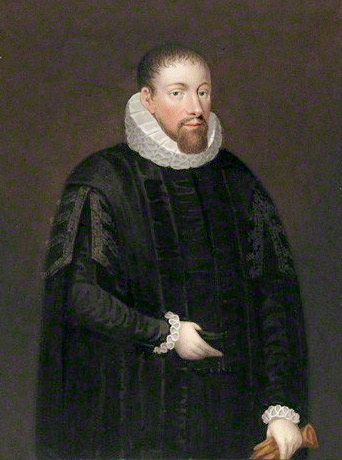
Robert Broke
Sir Robert Broke SL (c. 1515 – 5 or 6 September 1558) was an English judge, politician and legal writer. Although a landowner in rural Shropshire, he made his fortune through more than 20 years' service to the City of London. MP for the City in five parliaments, he served as Speaker of the House of Commons in 1554. He is celebrated as the author of one of the Books of authority. A prominent religious conservative, he founded a notable recusant dynasty. His surname is also rendered Brooke, and occasionally Brook, which are, for modern readers, better indicators of pronunciation.
This article is about the Lawyer and Judge. For the Goldsmith, see Robert Brook.
Robert Broke
Religious beliefs[edit]
Opinions on Broke's religious beliefs differ only in degree. The History of Parliament says: "There seems no doubt that Broke was a Catholic."[1] The 1904 Dictionary of National Biography quotes, without attribution, the description "zealous Catholic,"[2] which the Victoria County History account of his chief manor echoes with the more disparaging "zealous papist."[14] In 1548, it was reported that Broke and Clement Smith, MP for Maldon, smiled and laughed "when they heard the priest at St. Gregory's by Paul's at his prayers at mass pray God to send the Council grace to turn from their erroneous opinions that they were in", although the allegation was later withdrawn.[1]
Broke's religious conservatism was a persistent theme of his life. He had served as commissioner for heresies for London in 1541, when Henry VIII's final persecution of Protestants was launched. The commission to Edmund Bonner, the Bishop of London is faithfully preserved in Foxe's Book of Martyrs, with a list of the names of those whose oaths were to be taken, including notably Broke himself, Cholmley and Gresham.[18] However, in common with the Shropshire and Staffordshire gentry circle in which he moved, Broke showed no great sympathy for the power and wealth of the clergy. He worked to limit the power of the London clergy and later readily accepted lands expropriated from monasteries and chantries, using his power as Speaker to attempt to secure the purchases.
Broke's attitude was generally strictly professional: he was willing to use his legal skills on behalf of employers or clients, irrespective of their religious inclinations or intentions, so it is never entirely safe to read his beliefs from his actions. Hence he worked on both the passage and the repeal of the 1551 Treason Act, which specifically forbade religious criticism of Edward VI. It was never likely that he would appear on the October 1553 Crown Office list of MPs as one of "those which stood for the true religion," in this case, Protestant. Only 60 names are marked, although they include two colleagues, Blundell and Marshe.[19]
Broke married within his own Catholic regional circle: the Gatacres were to become mainly recusants, as were his own descendants.
Broke's inquisition post mortem records that he died on 5 September 1558 at Patshull Hall. However, his tomb inscription says that he died on 6 September, while "visiting his friends and country".[1] The discrepancy is small and it is possible he died in the night, with the precise moment unknown. He was buried in Claverley Church. His chest tomb bears his effigy, clad in his gown of office, lying between his two wives, with his children in miniature around the sides. It is by far the finest tomb in the church.
Broke's will was dated 7 January 1558. The executors of the will included Humphrey Moseley, a young lawyer and MP who was a close friend of Broke.[20] The overseers were William Gatacre, his father-in-law; John and Richard Brooke, his eldest son by each marriage; and Richard Whorwood, his "clerk and cousin". Whorwood very briefly took wardship of John, as he reached his twenty-first birthday in June 1559. The estates were divided between John and Richard, although the widow, Dorothy, had Lapley and retained Madeley until her death. The other sons were given £40 each, with the proviso that they take up study or trade to earn a living "meet for a gentleman's son."[1]







